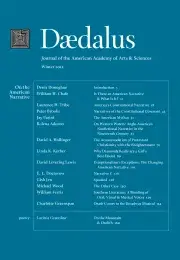The Other Case
This essay explores the suggestion that many American narratives are supplementary, correcting narratives–alternatives to the main story on offer. The guiding thought is that of Henry James’s “possible other case,” and the chief example is Cormac McCarthy’s “No Country for Old Men,” in which one story after another fails to cope with the ongoing mystery it faces. The novel may imply, then, that narrative itself, rather than any individual report or fiction, is in crisis or has come to the end of its road. A coda to the essay proposes the option of nonnarrative understandings of the world in those extreme situations where storytelling is no longer the sense-making activity we so often take it to be.
“Only she dont mean that,” Quentin Compson thinks at the start of Absalom, Absalom! when Rosa Coldfield gives him her reasons for telling him her story: that he may become a writer someday, “as so many Southern gentlemen and gentlewomen too are doing now,” and that he will “perhaps . . . remember kindly then the old woman who . . . talked about people and events you were fortunate enough to escape yourself.” In Quentin’s intuitive understanding, Rosa is not thinking about a literature of the future, nor is she worried about her own life in his memory. “It’s because she wants it told,” he insists to himself.
There is a subtle critical question here. What is it, and what does it mean to want it told? What is the difference between the desired telling, on the one hand, and literature and memory, on the other? The two are not logically or conceptually opposed: literature and memory both deal in, among other matters, getting things told. So how can Rosa not mean what she says, or not mean just that?
Quentin may believe that she is treating him as a recording angel, a scribe who does not even have to write, only listen. It will be told when she has finished telling him whatever she has to say. This explanation must be a piece of the truth, but Rosa seems to have more in mind: not just a record but a filling . . .
